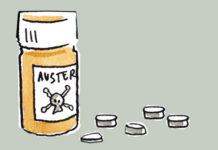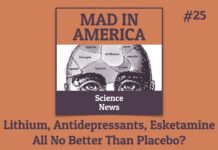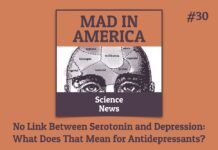Moving Global Mental Health “Outside Our Heads”
On MIA Radio we interview Dr. Derek Summerfield, honorary senior lecturer at the Institute of Psychiatry in London, former Research Associate at the Refugee Studies Centre at the University of Oxford and consultant at Oxfam.
Psychosocial Disability Rights and Digital Mental Health: An Interview with Piers Gooding
MIA's Emaline Friedman interviews legal scholar Piers Gooding on his work on disability rights and digital mental health technologies.
The Medicalization of Women’s Suffering: An Interview with Dana Becker
MIA’s Ayurdhi Dhar interviews Dana Becker about how therapeutic culture fails to adequately address women’s suffering.
Constructing Alternatives to the DSM: An Interview with Dr. Jonathan Raskin
Dr. Raskin discusses psychotherapists’ dissatisfaction with current psychiatric diagnostic systems and explores alternatives.
Peter Groot and Akansha Vaswani: Tapering Strips and Shared Decision-Making
Doctoral candidate Akansha Vaswani interviews researcher and geneticist Dr. Peter Groot, who has led the development of Tapering Strips, a novel and practical method by which people taking certain prescription medications can gradually reduce their dosage.
Trauma and Mental Health in Social Movements: An Interview with Janice Haaken
MIA's Emaline Friedman interviews psychologist and filmmaker Janice Haaken about how mental health discourse impacts social movements.
The Global ‘Mental Health’ Movement – Cause For Concern
On October 10th, 2018, World Mental Health Day, The Lancet Commission on Global Mental Health and Sustainable Development published a report outlining a proposal to “scale up” mental health care globally.
Can We Move Toward Mindful Medicine? An Interview with Integrative Psychiatrist Natalie Campo
MIA's Madison Natarajan interviews Natalie Campo about integrative psychiatry and holistic approaches to drug tapering and withdrawal.
Can Psychosocial Disability Transform Mental Health? A Conversation with Luis Arroyo and Justin Karter
Mad in Mexico's Luis Arroyo interviews MIA's Justin Karter about how psychosocial disability inclusion can transform Global Mental Health.
Tensions in Mental Health Care in China: An Interview with Zhiying Ma
Anthropologist Zhiying Ma explores mental health care in China, including tensions between Western psychiatry and socially-oriented local frameworks.
Why Some Experts and Patients Want to Rename Schizophrenia: Interview with Raquelle Mesholam-Gately and...
MIA interviews Matcheri Keshavan and Raquelle Mesholam-Gately on their research with service users and consumers on renaming schizophrenia.
Can Critiques of Psychiatry Help us Imagine a Post-Capitalist Future? An Interview with Hans...
An interview with Hans Skott-Myhre on the seeds of post-capitalist subjectivity to be found in the writing of Franco Basaglia and R.D. Laing.
Poverty, Pathology and Pills: An Interview with Dr. Felicity Thomas and Dr. Richard Byng
MIA’s Tim Beck interviews Dr. Felicity Thomas and Dr. Richard Byng about their report, Poverty, Pathology, and Pills, which situates increasing rates of mental health diagnosis and psychiatric prescriptions within socioeconomic and policy trends across the UK.
Getting Pharma Out of Medical Education: An Interview with Dr. Adriane Fugh-Berman
MIA's Gavin Crowell-Williamson interviews PharmedOut founder Dr. Adriane Fugh-Berman about Big Pharma's influence on medical education.
Questioning the Moral Panic Around Teletherapy: An Interview with Hannah Zeavin
MIA's Emaline Friedman interviews Hannah Zeavin about what the history of teletherapy reveals about its limitations and radical potential.
Racial Justice and Lived Experience in Mental Health Advocacy: An Interview with Pata Suyemoto
MIA's Julia Lejeune interviews scholar, activist, and educator Pata Suyemoto about lived experience activism and racial justice in the mental health field.
Where Western Medicine Meets Indigenous Healing: An Interview with Anthropologist Ian Puppe
MIA's Micah Ingle interviews the anthropologist Ian Puppe on how the imposition of psychiatric treatments can lead to harmful iatrogenic effects with Indigenous peoples.
MDMA Assisted Psychotherapy and Therapeutic Humility: An Interview with Marcela Ot’alora
Richard Sears interviews Marcella Ot’alora, therapist and principal investigator for MAPS MDMA-assisted psychotherapy.
Exercise for Youth Mental Health in the Lockdown: Interview with Psychologist Scott Greenspan
School Psychologist Scott Greenspan discusses how to promote exercise and mental wellbeing for adolescents stuck indoors during the pandemic.
Dr. Joseph Firth: The Role of Exercise and Nutrition in Early Psychosis
Dr. Joseph Firth of Western Sydney University talks about his research into the role of exercise and nutrition in supporting young people in the early stages of psychotic illness.
Discourse, Drug Use, and Psychiatry: An Interview with Critical Psychologist Ilana Mountian
Richard Sears interviews Ilana Mountian on drug use, marginalization, the disease model of addiction, and problems with prohibition.
Lithium, Antidepressants, Esketamine—All No Better Than Placebo?
Peter Simons covers a clinical trial that found lithium ineffective at preventing suicide attempts, an essay by Allen Frances on the overdiagnosis of depression and overprescription of antidepressants, a review of the ineffectiveness and dangers of antidepressants, and an analysis that revealed that esketamine failed five of its six clinical trials.
Unscientific Diagnoses Medicalize Normal Human Experiences
In this 30-minute podcast, Peter Simons reports on the latest scientific articles in psychiatry.
Pharma Corruption, Dangers of Antidepressants, And More
Peter Simons covers news on mental health app Cerebral and pharma companies Biogen and Cassava; how social media influencers are the new pharma marketers; studies that found antidepressants don't improve quality of life and are harmful to the fetus when pregnant women take them; benzo withdrawal; and more!
No Link Between Serotonin and Depression: What Does That Mean for Antidepressants?
Peter Simons covers in detail a new systematic review that debunks the widely popularized myth of low serotonin in depression, the “chemical imbalance theory.”

































